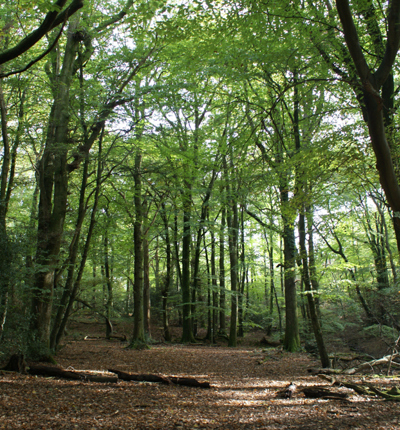
Wild Justice slams environmental provisions in government’s new Planning and Infrastructure Bill
Conservation campaign group Wild Justice has slammed the environmental provisions in the government’s new Planning and Infrastructure Bill (PIB), arguing that it will erase the level of environmental protection provided by existing law.
Posted on 02 May 2025
This counters the government’s claim that the bill will not reduce the level of protection, an opinion for which Wild Justice says there is no legal rationale and will result in developers effectively being given a licence to damage protected habitats and species without meaningful consequence.
Under existing planning law, certain habitats that are home to protected species of wildlife are given special protection.
These protected areas are currently safeguarded by a requirement for a planning authority or the Secretary of State to show beyond reasonable scientific doubt that a development would not negatively impact the area.
In March 2025, the government introduced the PIB to Parliament, which Wild Justice says would fundamentally disregard the environmental safeguards currently embedded in planning and infrastructure processes in England and Wales should it be passed into law.
The PIB was introduced by the Secretary of State for Housing, Communities and Local Government and Deputy Prime Minister Angela Rayner, who made a statement to Parliament in March 2025 that these changes will not reduce the level of environmental protections in planning law.
The 2021 Environment Act states that the government can ask for expert advice from the Office for Environmental Protection (OEP) where a new law might reduce current levels of environmental protection. However, the OEP has confirmed to Wild Justice that the government did not ask it for any advice before introducing the PIB.
The OEP has since stated that the bill in its current form would be a 'regression' of environmental protections, and has written to the government advising how these protections could be strengthened.
Wild Justice commissioned two expert planning barristers to review the potential effects of the bill, who concluded in a written opinion that it would in fact weaken the existing level of environmental protection.
The opinion highlights a key factor as being the removal of the requirement to be sure beyond reasonable scientific doubt that a development would not have a negative impact on a protected site.
It would instead allow developers to pay into a so-called ‘nature restoration levy scheme’ to attempt to mitigate any environmental harm caused, which Wild Justice says would be meaningless because the Secretary of State wouldn’t have to judge the level of mitigation on the basis of rigorous scientific evidence, but rather on the vague ‘likelihood’ that mitigation may be at an appropriate level.
As well as this, the Wild Justice-commissioned legal opinion highlights other aspects of the bill that would result in the weakening of environmental protections, relaxing the circumstances in which developers would be allowed to cause harm to the environment.
The proposed PIB would allow for a significant or permanent loss of species at a protected site so long as it is compensated for at another site, which is currently only allowed if there are imperative reasons of overriding public interest and as a last resort.
However, under the new bill, developers would no longer be required to undertake up-to-date ecological site surveys prior to development work so without a baseline of what will be lost, mitigation can’t properly be addressed.
The opinion concludes that the government’s assertion that the bill would not reduce the level of environmental protection provided by existing law is ‘obviously wrong as a matter of law’.
Chris Packham, co-director of Wild Justice said:
“It’s not only 007 who has a licence to kill...this is a bid by Number 10 to murder hard won and essential environmental legislation and unleash hell upon the last vestiges of the UK’s natural treasures. If this passes it will be as easy as one-two-three for developers to cut down that ancient tree - the tree that you’ve loved all your life, the tree that supports so much life. The chainsaws are coming, the Sycamore Gap slaying will be nothing compared to the widespread decimation of our wildlife and its habits. Every one of us must resist this, this is not what we voted for, we voted for a liveable future - not desolation.”
Dr Ruth Tingay, co-director of Wild Justice said:
“Not only is the government’s assertion about the new planning bill ‘obviously wrong as a matter of law’, the bill itself is obviously wrong as a matter of principle and public interest. Slashing environmental protection during a nature and climate and emergency is idiotic, unconscionable and the consequences catastrophic. We could be forgiven for thinking Donald Trump had taken up residence at Number 10. Wild Justice is exploring all legal options to challenge the provisions of this bill.”
Bob Elliot, CEO of Wild Justice said:
This bill is a developers charter to trash nature. It tears up vital environmental safeguards, ignores expert legal advice, and treats wildlife law as an obstacle trashing our most treasured places and wildlife. This is not just reckless; it is a national scandal. This legal opinion lays bare the truth, and we believe other wildlife and environmental organisations will find it essential reading.
Leigh Day partner Ricardo Gama, who represents Wild Justice, said:
“The 2021 Environment Act introduced obligations on the government to be open and transparent about whether any new laws introduced post-Brexit would reduce the current level of environmental protection. The Housing Secretary has said that this bill does not reduce current environmental protections, but Wild Justice do not believe that that to be the case. It hopes that the government will reconsider these damaging proposals.”
The legal opinion commissioned by Wild Justice has been published on its blog.

Ricardo Gama
Ricardo specialises in judicial review claims, in particular on environmental issues.

Transport Action Network appeal against government cuts to cycling and walking funding
Campaign group Transport Action Network (TAN) is appealing against the government’s decision to cut funding for cycling and walking schemes across England.

River Action issues legal challenge against Ofwat over water bill regulation
River Action has issued a legal challenge against Ofwat accusing it of failing to properly regulate water companies, which the campaign group says could result in customers effectively having to foot the bill to cover past infrastructure failures.

